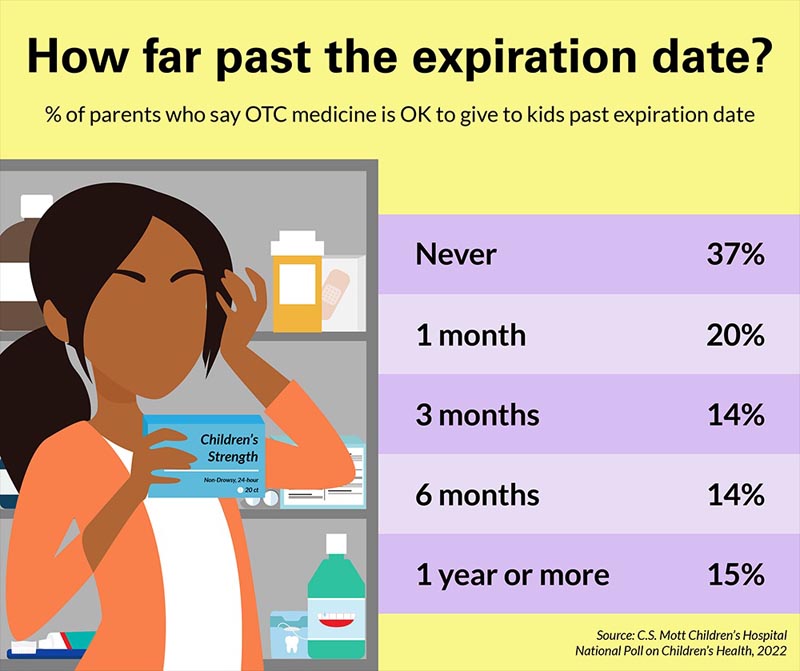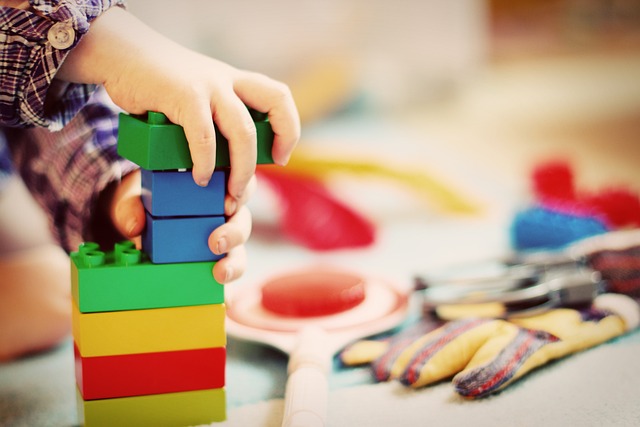Highlights
|

Image : Less than half of parents believe that over-the-counter medications are less effective after their expiration date, while one in five parents think it is unsafe. Credit : National Survey of Children’s Health from CS Mott Children’s Hospital at University of Michigan Health.
Many parents are unsure how to dispose of unused medicines, with one in five thinking it is unsafe to take medicines after the expiration date, a national survey suggests.
Nearly half of parents say they have leftover prescription medications at home, according to the National Survey on Children’s Health from CS Mott Children’s Hospital at University of Michigan Health.
Four in five parents say they have thrown away over-the-counter medications after the expiration date.
“We found that it is common for parents to keep medications long after they have expired or are no longer needed, creating an unnecessary risk to children’s health,” said Mott Poll Co-Director Sarah Clark, MPH.
“Younger children receiving medications at home are a major source of unintentional poisonings. For older children, access to these medications carries the risk of experimentation, diversion to peers, or other intentional misuse.”
The nationally representative survey was based on 2,023 responses from parents of children under the age of 18 who were surveyed between August and September 2022.
Less than half of parents believe that over-the-counter medications are less effective after their expiration date, while one in five parents think it is unsafe.
“Parents may not realize the medication is expired until they need it to treat their child’s symptoms,” Clark said. “At that point, parents must decide whether to give their child the expired medication or go out and buy a new medication.”
More than a third of parents say it is never okay to give your child expired medication. But one in three parents think it’s okay to do it up to three months after the due date, and about the same number say it would be okay after six months or more.
“The expiration date is the manufacturer’s guarantee that a medication is completely safe and effective; Over time, the medication will lose its effectiveness,” Clark said. “Parents considering giving their child a medication long after its expiration date should ask themselves how well it will work.”
Proper Medication Disposal
More than three in five parents say they are more careful when disposing of leftover prescription medications than over-the-counter medications. Most also believe that it is important to properly dispose of expired or leftover medications to prevent children from coming into contact with the medications and to protect the environment.
Still, many parents struggle to know how to get rid of it. Nearly three-quarters say they don’t know which medications should be mixed with coffee grounds or cat litter, and one in seven have flushed medications down the toilet.
The safest option, Clark said, is to drop off medications at a permanent collection site at a doctor’s office, pharmacy or hospital, or at a community site in conjunction with the Oversight Administration’s twice-yearly national drug take-back day. US Drug Enforcement Administration
“Unused and expired medications are a public safety issue and pose health risks to children,” Clark said. “It is important that parents dispose of them correctly when they are no longer needed to reduce the risks of children getting sick, as well as the negative impact on the environment.”
How to properly protect children from unused medications
- Limit the amount of medications you bring home. Avoid purchasing over-the-counter medications in larger quantities than your family needs. For medications prescribed for "as needed" use, such as pain relievers, consider filling only part of the prescription and return to the pharmacy for additional doses only if needed.
- Keep prescription and over-the-counter medications in their original packaging that includes dosage and expiration information. Check the expiration dates on your child’s over-the-counter medications twice a year, especially before allergy and/or flu season.
- Block or at least monitor certain medications that can be misused, including pain relievers and sleeping pills, especially if there are older children in the home.
- Safely dispose of unused or expired medications by dropping them off at a permanent collection site (such as a local hospital, pharmacy, or doctor’s office) or at a periodic take-back event. Some pharmacies also have mail-in return options.
- If you are unable to return the medication to a collection site, a secondary option is to dispose of it in your household trash. The medication should be in a plastic bag, dissolved with water, and mixed with cat litter or ground coffee so that it is not attractive to children or pets. Sealing the bag will prevent the medication from leaking.
- Avoid flushing expired or unused medications down the toilet or sink, which can cause the medications to enter the water supply and expose residents to chemicals in drinking water.
















